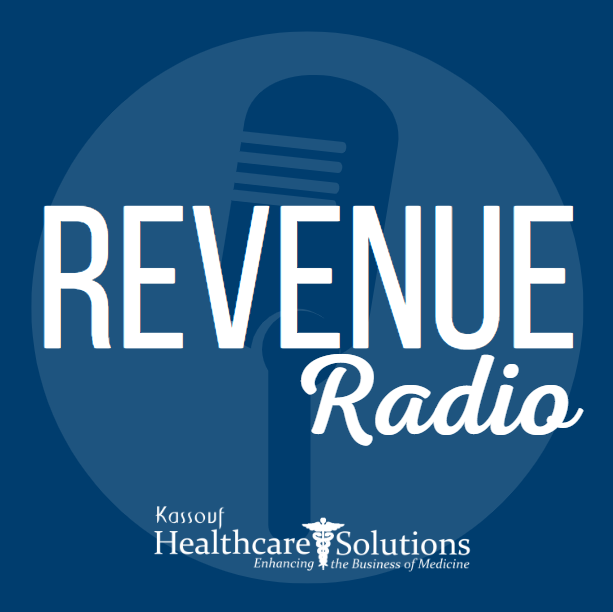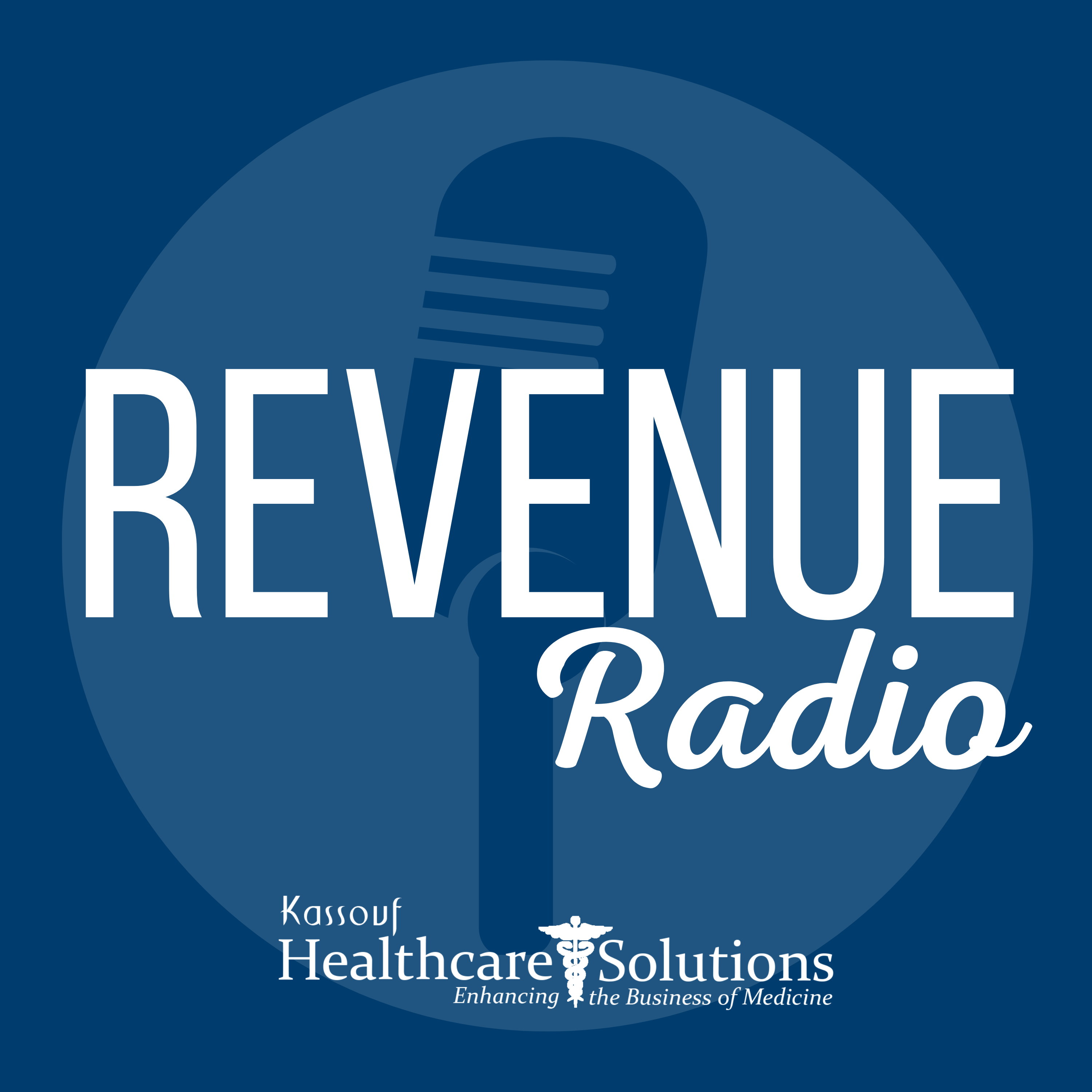Episode Transcript
Speaker 1 00:00:04 Hello and welcome to Revenue Radio, powered by Kassouf and Kassouf Healthcare Solutions, where we enhance the business of medicine. My name's Jeff Dance. I'm the executive director of Kassouf Healthcare Solutions. We're a full service managed services organization and, uh, our sole, uh, goal is to make sure that your practice, uh, runs smoothly, uh, that your revenues, your profits, uh, your net income, all of those fit towards your, your business goals, uh, in the healthcare setting.
Speaker 2 00:00:38 Today's episode of revenue radio is a little different. Today you're gonna hear an excerpt from Healthcare Headlines, a joint workshop between casus and Kassouf Healthcare Solutions that offered updates on healthcare's most timely topics. Today our expert is Senior Director of Operations, Jessica Bakane, who works for Kassouf Healthcare Solutions. She is gonna share details on preparing for non-physician provider documentation changes. Thanks for listening.
Speaker 3 00:01:10 So non-physician practitioner billing rules change, um, wanted to talk a little bit about the CMSs, refining our longstanding policies for split or shared e m visits, um, to better reflect the current practice of medicine, um, as well as the evolving role of our non-physician practitioners or NPPs as members of the medical team, and to clarify conditions of payment that must be met to Medicare for these services. So, substantive portion, Uh, the current definition as it is today, um, these are a m visits provided in a facility setting by a physician and an NPP in the same group. So when we talk about these split or shared services, which are used to determine if a claim for a service jointly performed by a PA or a nurse practitioner and a physician can be billed under the physician's name and their npi, um, as we all know, Medicare payment is made at a hundred percent when billed under the physician, as opposed to 85 to 70% depending on the payer.
Speaker 3 00:02:24 Um, when bill under the PA or np, in order for the services to be billable under the physician's name, the physician must perform a substantive portion of the service. So in 2022, this portion of the service by a physician is defined by one of two things. One, either the physician personally performs either the history, the physical exam, or performs the medical decision making in its entirety or to the physician spending more than half of the total time. We've talked a lot about time over the last couple of years and what that means by both the physician and the PA or NP on face to face or non-face to face patient care activities. So the summary of what is proposed in 2023 and later, what we'll talk about for 2024 is only time will be used to define that substantive portion of care, which means the health professional who spends the majority of time providing care to the patient is the one whom the service should be billed.
Speaker 3 00:03:35 Other requirements that must be met for a physician, an MD to bill a service as split or shared under their name or NPI, is that physician and that PA or nurse practitioner must work for the same group. Um, in addition, this service must be performed on the same calendar day and the service must be performed in a hospital facility or hospital outpatient office. So we're talking about inpatient, primarily inpatient services here, not outpatient or in office services. Documentation in the medical record must clearly identify the physician and non-physician practitioner who perform the visits and the individual who performed a substantive portion. And again, we talked about that at the visit and therefore builds the visit, must sign and date the medical records. So that's very important as well. As you can see in this table, we've outlined the different type of inpatient or facility in a visit code types, whether that's an outpatient visit, an inpatient, an emergency department, or critical care, what that definition of substantive portion is in 2022 versus what they're proposed in 2023.
Speaker 3 00:04:54 Um, as we are doing today, we, the physician can use that history exam or medical decision making, um, or the total half of the total time for those first three critical care today, as it will in next year still is more than half of total time. And again, next year, they're proposing that that be changed to more than half a total time. So that's gonna really impact the way our physicians are rounding in the hospitals, rounding in these inpatient facilities and interacting with these non-physician practitioners. I've also taken a couple of these codes that Margaret presented earlier, and as you can see, Medicare reimburses 85% of the physician fee schedule for these non-physician practitioners. And we know Blue Cross reimburses at a rate of 70%. This is the impact that this could mean to your practice. Um, and these new guidelines, um, if our physicians are rounding merely to perform an exam and sign off on a medical record, that may not be the case in the years to come. Um, when, when we know our nurse practitioners in the hospitals are in these facility settings are really the ones providing the majority of the care and the majority of the time that that patient sees. So our code word number five is surprise for your CEU credits.
Speaker 3 00:06:27 So the latest update, surprise surprise, CMS, is delaying, um, this rule, um, for calendar year 2023. Uh, CMS pres proposing to delay the split or shared visits policy that they finalized last year for the definition of the substantive portion as more than half the total time for one year, which means that this split didn't go into effect until calendar year 2024. And we're hoping again, Mike, Joanie and Margaret stated that the final rule will come out later this year. But remember, if they don't delay that, again, these visits will change where total time will need to be documented, will need to be, um, billed under, you know, which provider completes the majority of that totalle time. Whereas today, your physicians can still document and perform, perform either the history, the exam, that medical decision making, and still that service can be billed under that physician.
Speaker 3 00:07:34 So what do I do and what are our recommendations, um, for you and your practices for the remainder of this year, as well as next year and preparation for what's coming? Um, maintain quality documentation. Uh, begin now implementing good habits, um, and documenting time with the patients. Um, encourage your physicians again to document time to work with your nurse practitioners in these hospital settings. Use efficient software applications, um, applications to get away from paper, face sheets. We know a lot of our physicians who round in the hospitals like to have either cards or paper face sheets. We could utilize technology, um, and applications to interface those systems, um, to get access to those systems for better, uh, documentation as well as time that will help us in the future develop proper workflows for inpatient consults between your physicians and your non-physician practitioner staff and communication. Prepare financial models to understand the impact, um, as it relates to reimbursement changes in the future. Um, you know, as we know it's hard to affect change with our physicians. Um, begin speaking with these hospitals now. Begin speaking with your physicians now, um, to limit that burden and that change, um, in the future. I'm gonna pass it
Speaker 1 00:08:59 Over. So again, to our listeners, thank you for being with us today. We hope, uh, to see you back soon on another episode of our Revenue Radio that's powered by Kassouf and Kassouf Healthcare Solutions, uh, where we enhance the business of medicine. This is Jeff Dance, Executive Director of Kassouf Healthcare Solutions. Wishing you a very good day. Thank you for being with us. Thanks.


